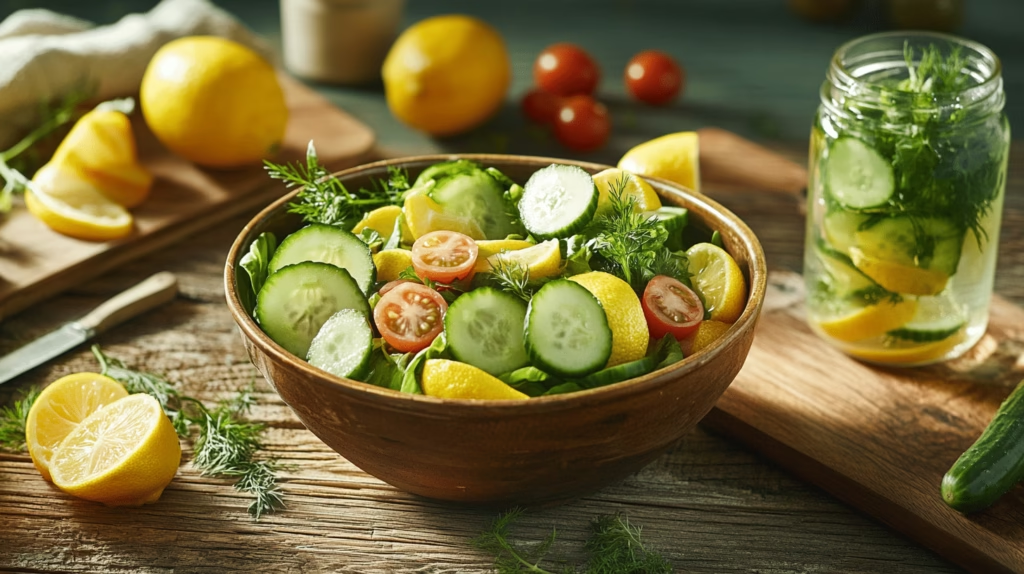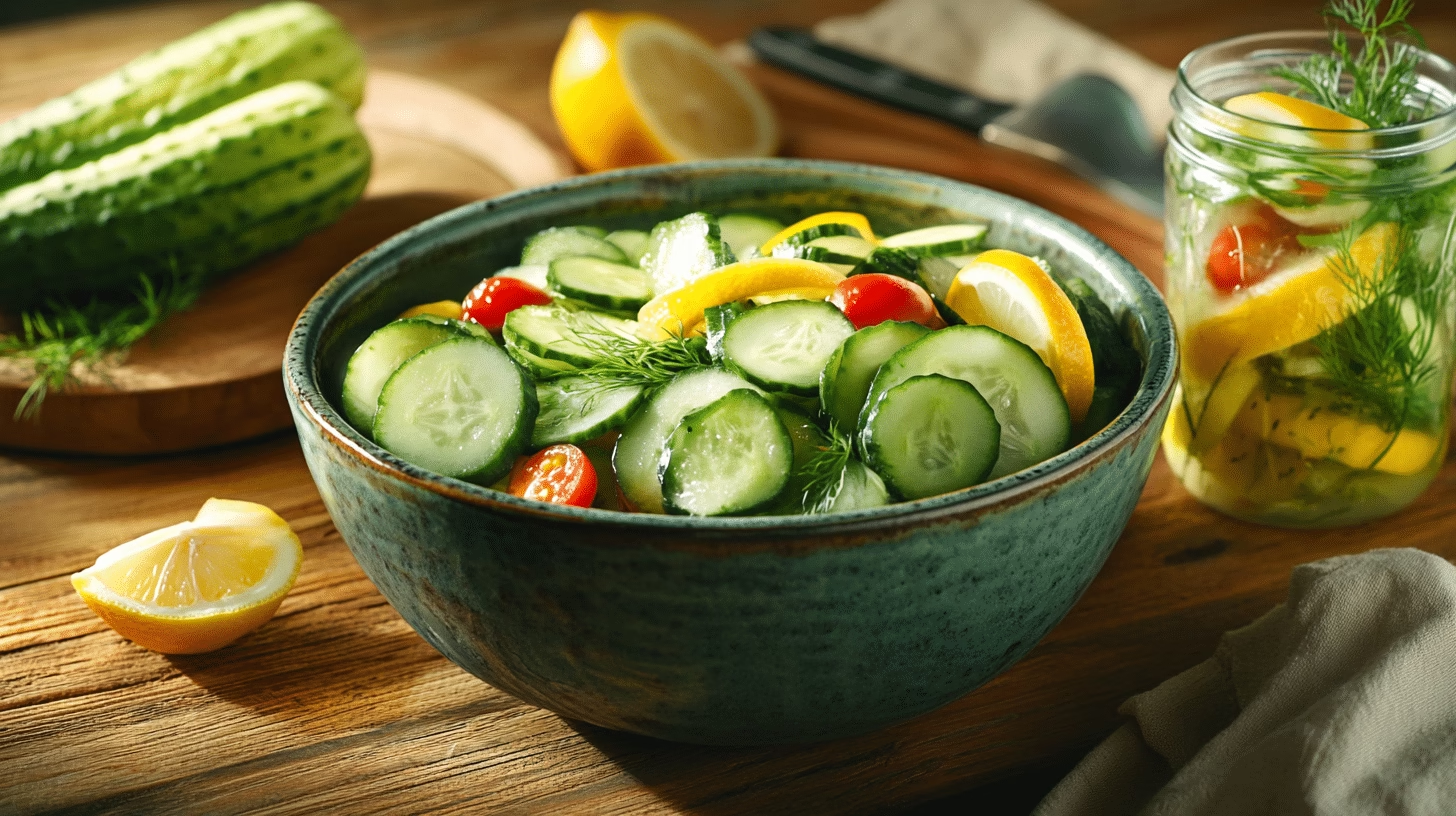Introduction
Lemon cucumber is an intriguing and versatile vegetable that has gained popularity for its unique appearance and mild, refreshing flavor. These small, round, yellow cucumbers look like lemons but offer a sweet, crisp texture that sets them apart from standard cucumbers. Whether you’re curious about their culinary applications, health benefits, or how to grow them in your garden, this guide will provide all the answers. Discover why lemon cucumbers are a must-have addition to your kitchen and garden.
What Are Lemon Cucumbers?
Lemon cucumbers are a type of heirloom cucumber that is known for its bright yellow skin and round shape. Despite their name, they don’t taste like lemons but instead have a mild, slightly sweet flavor with a juicy crunch. Their thin skin is entirely edible, although some people prefer peeling it for a smoother texture.
Originating in India, cucumbers, including the lemon variety, have been cultivated for thousands of years. Lemon cucumbers were introduced to the United States in the late 19th century and have since become a favorite among gardeners and food enthusiasts. Their ability to thrive in warm climates and produce abundant yields makes them a popular choice for home gardens. Learn more about growing lemon cucumbers in this gardening guide.
How Are Lemon Cucumbers Grown?
Growing lemon cucumbers is a rewarding experience for gardeners of all skill levels. These plants thrive in sunny conditions and well-drained soil with a slightly acidic pH (between 6.0 and 6.5). To ensure successful growth, follow these tips:
- Planting: Sow seeds directly into the soil after the last frost. Lemon cucumbers require warm temperatures to germinate.
- Watering: Keep the soil consistently moist but avoid overwatering, which can lead to root rot. Mulching around the plants helps retain moisture.
- Harvesting: Pick lemon cucumbers when they’re about the size of a tennis ball. Overripe cucumbers may develop a bitter taste.
Not only are they easy to grow, but they also add visual interest to your garden with their vibrant yellow fruits.
Culinary Uses of Lemon Cucumbers
Lemon cucumbers are incredibly versatile in the kitchen, lending themselves to a wide variety of dishes:
Raw Applications
- Salads: Lemon cucumbers add a refreshing crunch to salads. Pair them with cherry tomatoes, red onions, and a citrus vinaigrette for a simple yet flavorful dish.
- Snacking: Enjoy them raw with a sprinkle of salt or dip them in hummus for a healthy, hydrating snack.

Cooked Dishes
- Salsas and Relishes: Diced lemon cucumbers can be mixed with ingredients like jalapeños, cilantro, and lime juice to create a zesty salsa.
- Soups: Add them to chilled soups like cucumber gazpacho for a cooling summer treat.
Pickling
Pickling is one of the best ways to preserve lemon cucumbers. Their firm texture and mild flavor make them ideal for creating tangy, crisp pickles. For a step-by-step guide to pickling, visit this easy pickling recipe.
Popular Recipes Featuring Lemon Cucumbers
Lemon cucumbers are a versatile ingredient that can add a refreshing twist to various dishes. Their mild, slightly sweet flavor and crisp texture make them a great addition to salads, drinks, and pickled treats. Try these delicious recipes:
Lemon Cucumber Salad with Feta and Mint
A light and flavorful salad that pairs well with grilled meats or Mediterranean dishes.
- Ingredients: Sliced lemon cucumbers, crumbled feta cheese, fresh mint leaves, olive oil, lemon juice, salt, and black pepper.
- Instructions: Toss the cucumber slices with feta and mint, then drizzle with olive oil and lemon juice. Season with salt and pepper for a bright, refreshing side dish.
Pickled Lemon Cucumbers
A tangy and crunchy snack that enhances sandwiches, burgers, and charcuterie boards.
- Ingredients: Lemon cucumbers, white vinegar, garlic cloves, fresh dill, mustard seeds, salt, and sugar.
- Instructions: Slice the cucumbers and pack them into a jar with garlic and dill. Heat vinegar, water, salt, and sugar until dissolved, then pour over the cucumbers. Let them sit in the fridge for at least 24 hours before enjoying.
Lemon Cucumber Infused Water
- Ingredients: Sliced lemon cucumbers, lemon slices, fresh mint leaves, and cold water.
- Instructions: Add all ingredients to a pitcher of water and let it sit for at least an hour to allow the flavors to infuse. Serve chilled for a revitalizing beverage.
A naturally flavored, refreshing drink that helps with hydration.

These easy and delicious recipes highlight the versatility of lemon cucumbers and are perfect for warm weather or a light, refreshing addition to your meals.
Nutritional Value of Lemon Cucumbers
Lemon cucumbers are not only delicious but also packed with nutrients:
- Hydration: With a water content of over 90%, they’re an excellent way to stay hydrated.
- Low in Calories: At just 16 calories per 100 grams, they’re ideal for weight management.
- Rich in Vitamins: They’re a good source of vitamins A, C, and K, which support immune health, skin repair, and blood clotting.
- Minerals: Lemon cucumbers contain potassium and magnesium, essential for maintaining healthy blood pressure and muscle function.
For a detailed breakdown of cucumber nutrition, see this health benefits guide.
Health Benefits of Lemon Cucumbers
Promoting Hydration
Lemon cucumbers are a hydrating powerhouse, perfect for replenishing fluids during hot weather or after exercise. Their high water content helps regulate body temperature and flush out toxins.
Supporting Skin and Hair Health
The antioxidants and vitamins in lemon cucumbers contribute to glowing skin and strong hair. Vitamin C boosts collagen production, while the antioxidants combat free radicals that cause aging.
Aiding in Weight Management
Low in calories but high in fiber, lemon cucumbers keep you feeling full, making them a smart addition to any weight loss plan. They can be a satisfying replacement for higher-calorie snacks.
Improving Digestive Health
Their fiber content aids in digestion, prevents constipation, and promotes a healthy gut. Consuming them regularly can also reduce bloating and support overall gastrointestinal health.
Providing Antioxidant Support
Lemon cucumbers contain antioxidants like beta-carotene and flavonoids, which reduce inflammation and lower the risk of chronic diseases.
Flavor Pairings for Lemon Cucumbers
Lemon cucumbers have a crisp texture and a subtly sweet, refreshing flavor, making them an excellent addition to a wide variety of dishes. Their versatility allows them to be paired with various ingredients to enhance their taste and nutritional benefits:
- Herbs: Fresh herbs like mint, dill, and basil bring out the mild, slightly citrusy notes of lemon cucumbers. Try adding chopped dill to a cucumber salad or using basil for a Mediterranean-inspired dish.
- Proteins: Lemon cucumbers pair well with grilled chicken, feta cheese, and smoked salmon, adding a refreshing crunch to proteins while balancing rich and savory flavors.
- Dressings: Citrus-based vinaigrettes made with lemon or lime juice enhance the cucumbers’ natural brightness, while creamy yogurt-based sauces create a smooth contrast to their crisp texture.
- Spices: A pinch of black pepper, sumac, or chili flakes adds a bit of heat and complexity to cucumber-based dishes.
Storage Tips for Lemon Cucumbers
To keep lemon cucumbers fresh and flavorful, proper storage is key:
- Refrigeration: Store them in a perforated bag or loosely wrapped in a paper towel inside the crisper drawer. This helps maintain airflow and prevents excess moisture buildup, which can lead to spoilage.
- Avoid Pre-Washing: Wait until you’re ready to use them before washing. Moisture trapped on the skin can cause them to deteriorate faster.
- Long-Term Storage: If you have an abundant supply, consider pickling them in a vinegar brine with garlic and dill for a tangy preserved snack. You can also slice and freeze them for later use in infused water or smoothies.
- Spoilage Signs: Soft spots, wrinkling, discoloration, or an off-putting sour smell indicate that the cucumbers are past their prime and should be discarded.
By following these storage and pairing tips, you can make the most of lemon cucumbers in your kitchen while keeping them fresh for longer!
Final Tips & Takeaways
Common Issues When Growing Lemon Cucumbers
Gardening Challenges
Pests: Aphids and cucumber beetles are the most common threats to lemon cucumber plants. These insects can damage leaves, stunt growth, and spread diseases. To protect your plants:
- Introduce natural predators like ladybugs to control aphids.
- Use insecticidal soap or neem oil for organic pest management.
- Cover young plants with row covers to prevent beetles from feeding on them.
Diseases: Powdery mildew is a frequent issue, especially in humid conditions. This fungal disease appears as white, powdery spots on leaves and can weaken the plant over time. Prevent powdery mildew by:
- Ensuring proper plant spacing to improve air circulation.
- Watering at the base of the plant instead of overhead to keep leaves dry.
- Using disease-resistant cucumber varieties when possible.
Culinary Mistakes
Harvesting at the Wrong Time: Overripe lemon cucumbers can develop a bitter taste and tough skin. To ensure the best flavor:
- Pick them when they are still small (about the size of a lemon) and firm.
- Avoid leaving them on the vine too long, as they may lose their crisp texture.
- Store harvested cucumbers properly to maintain freshness.
By staying vigilant against pests and diseases and harvesting cucumbers at the right stage, you can grow a bountiful crop that’s perfect for fresh salads, pickling, and summer snacks!
Articles You Might Be Interested By:
If you’re exploring lemon cucumbers and their culinary or health benefits, here are some related articles from the site that might interest you:
- Lemon Cucumbers: A Fresh Addition to Your Table
- Salad Bowl
- What Foods Can You Eat Unlimited Amounts of on Keto?
These articles offer insights into incorporating lemon cucumbers into your meals, pairing them with other ingredients, and exploring their role in a healthy diet!
FAQs
What Do Lemon Cucumbers Taste Like?
Lemon cucumbers have a mild, sweet flavor with none of the bitterness sometimes found in regular cucumbers.
Can You Eat the Skin of Lemon Cucumbers?
Yes, the skin is entirely edible, although it can be peeled for a smoother texture if preferred.
Are Lemon Cucumbers Hard to Grow?
Not at all! They thrive in warm climates and are relatively low-maintenance, making them ideal for beginner gardeners.
How Are Lemon Cucumbers Different From Regular Cucumbers?
Lemon cucumbers are smaller, rounder, and have a sweeter flavor compared to traditional cucumbers, which are typically longer and less sweet.
Are Lemon Cucumbers Suitable for Juicing?
Yes! Lemon cucumber juice is refreshing, hydrating, and packed with vitamins. Add mint or ginger for extra flavor.
Conclusion
Lemon cucumbers are a delightful addition to any diet, offering versatility in the kitchen and numerous health benefits. Whether you enjoy them raw, pickled, or cooked, they bring a unique flavor and texture to your meals. Their ease of growth and vibrant appearance also make them a favorite for home gardeners. Explore the many ways to incorporate lemon cucumbers into your culinary repertoire and reap their nutritional rewards.

